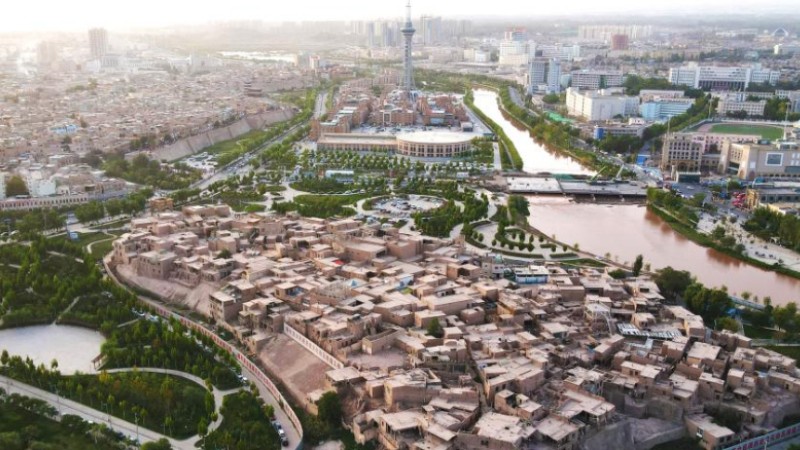Pulse on China’s economy: Consumption, biggest growth driver, remains solid, defying ‘ghost town’ claims
A recent article from US news magazine Newsweek, entitled "Has China's Shanghai Turned Into 'Ghost Town'? What Photos Show" citing a user of social media platform X and photos he posted which suggested China's Shanghai has turned into a "ghost town," has stirred strong sentiments on Chinese social media, with a topic about the article on one social media platform garnering more than 10 million views as of Monday. Many expressed shock at the absurdity of the photos cited in the article trying to paint one of the world's biggest cities with a population of about 25 million people as a "ghost town."
Still, for many Chinese, such photos and the article with a sensational headline did not come as a big surprise, due to the tsunami of misinformation Western officials and media outlets have unleashed in recent months in what analysts call a concerted smear campaign to paint the Chinese economy as being at the cusp of "collapsing." Even US President Joe Biden has joined the campaign, first describing the Chinese economy as a "time bomb," albeit getting the numbers wrong and most recently calling China's economic situation a "crisis."
However, what's happening in the Chinese economy is completely different from what these Western officials and media outlets claim. In trying to take the pulse on the Chinese economy from the angle of the three biggest growth drivers - consumption, investment and exports - Global Times reporters recently visited many cities across the country and saw bustling scenes at night markets, shopping malls and scenic spots. Such scenes are vivid displays of the vitality of consumption, the biggest driver, and hence the vitality of the Chinese economy, which faces risks and challenges, but remains on a steady recovery path, analysts noted.

Left: Picture of an empty Starbucks store from Yon's post. Right: People walking by the Starbucks near Shanghai World Financial Center on Monday. Photo: GT staff reporter
Bustling scenes
On Monday, Global Times reporters visited several places, empty pictures of which were posted on the US social media platform X, formerly known as Twitter, and were then cited by Newsweek in its article suggestively asking "Has China's Shanghai turned into 'ghost town'?" The article, despite noting "disputes" over how the pictures were used in social media, also claimed that "economists have raised concerns about the state of the Chinese economy." Upon arrival, it became immediately clear that the pictures did not capture the accurate situation on the ground.
At a Starbucks store in Shanghai's Lujiazui financial district, which looked completely empty in the pictures posted on X, there were hardly any empty tables left at 1 pm, with dozens of consumers enjoying their coffees and others waiting in line to get theirs. Starbucks' strong performance and huge future plans in the Chinese market are a further crucial indicator that directly shows how inaccurate the picture is. In the latest fiscal quarter, the US coffee chain saw its China revenue grew 51 percent year-on-year. It has opened 6,480 stores in China and plans to increase that to 9,000 by 2025. It makes no sense that Starbucks would open stores to be empty.
Official data also shows that Shanghai, opposite to being a "ghost town," is bustling with visitors and business. In the first half of 2023, Shanghai saw 139 million domestic trips made and more than 155 billion yuan ($21.25billion) in tourism revenue, both up 100 percent year-on-year, according to official data. Foreign businesses have also flocked to Shanghai in greater numbers. From January to July, Shanghai set up 3,261 new foreign-invested enterprises, an increase of 50.6 percent over the same period last year.
Shanghai is hardly alone in seeing such robust vitality. In Beijing, concert-goers packed shops near the National Stadium, known as the Bird's Nest, well into the night, while movie-goers also stayed up late to catch the latest showings over the weekend. At the just-concluded 2023 China International Fair for Trade in Services, consumers emptied shelves of foreign products such as Georgian wine. In Hotan, Northwest China's Xinjiang Uygur Autonomous Region, the night market was crowded at around 7 pm, as locals and visitors alike came to eat local specialties, enjoy traditional music and even dance to it.
All of these scenes translate into strong figures. During the summer travel peak between June and August, the number of domestic trips totaled 1.839 billion, generating a revenue of 1.21 trillion yuan, according to industry data. Many areas of consumption saw strong growth or even record high numbers during the period. Total box office takings reached a new high of 20.6 billion yuan.
"Judging from how busy the airport was, the growth of passenger and cargo volumes, and the recovery of catering and tourism, residents' consumption has recovered," Tian Yun, a Beijing-based economist, told the Global Times on Monday, noting that many indicators had surpassed that before the pandemic. "Basically, it shows that the impact of the pandemic on normal life has subsided."

Inside the Starbucks store near Shanghai World Financial Center Photo: GT staff reporter
Solid confidence
Another clear indication of Western bias is that even as Western officials and media outlets continue to paint a dire picture of the Chinese economy, foreign businesses, including those from the West, continue to visit China and seek to expand in China - or voting with their feet, as many in China describe it.
In fact, many are quite blunt about their views on the Chinese market. Kevin Chen, a manager with Australian honey brand ANB, said the vast potential of the Chinese market allowed his company to have robust sales once they branded their items for sales on Chinese e-commerce websites. "We are very confident in the Chinese market, and genuinely hope there can be more trade and investment going back and forth between the two countries that will boost our sales and cooperation," Chen told the Global Times.
China's massive consumer market of 1.4 billion people, including a middle-income group of more than 400 million people, is unique in the world and one that is hard to ignore by global businesses - be it luxury goods makers in Europe or agricultural exporters in Latin America. In fact, while visiting Beijing late last month, US Commerce Secretary Gina Raimondo even personally promoted US personal care products to Chinese consumers, insisting this type of trade won't impact the US' "national security."
The confidence in the Chinese consumer market comes not just from its sheer size, but also a slew of measures from Chinese policymakers that aim to tackle risks and challenges and build a massive national unified market that will not just underpin China's own long-term, sustained growth, but also offer more opportunities for global businesses, analysts noted.
In late July, Chinese policymakers issued 20 measures to boost domestic consumption, including support for expanding real estate and auto sales. Officials and banks have also in recent days moved to spur property sales through measures such as relaxed purchase restrictions and lower mortgage rates. Chinese officials have also said that positive initial results have been achieved in building a unified national market and vowed to further carry out the major strategy.
Tian said that while the consumption market has been steadily recovering, its vast potential has not been fully unleashed yet, which requires more policy measures such as the building of a unified national market. "Building a unified national market is crucial for economic growth," he said, noting that with the development of various consumption sectors such as new-energy vehicles, "the engine for growth is just getting started."
Photos
Related Stories
- China kicks off farmers' harvest festival consumption season
- Chinese Valentine's Day sees sales up as sweethearts splash out
- Chinese sportswear giant Anta posts rising revenue, profit in H1
- China's services sector sees strong recovery momentum in July
- Growth beckons despite bumpy road ahead
- Foreign firms pin hopes on China market, as stimulus set to drive consumption in H2
- Slew of measures unveiled to help boost consumption
- Summer shows cool ways of winning in biz
- China unveils policy incentives to boost consumption
- China growing into source of consumer goods innovation
Copyright © 2023 People's Daily Online. All Rights Reserved.









